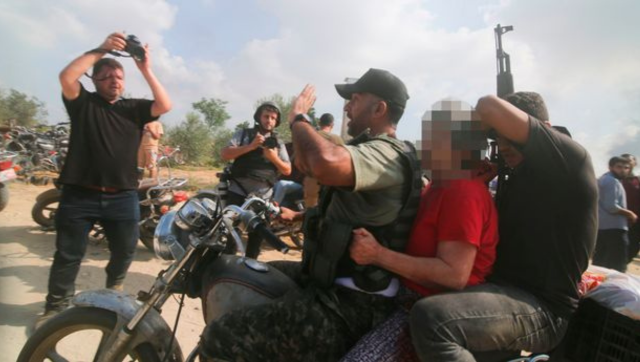The capture of scores of Israeli soldiers and civilians–elderly, women, children, entire families–by Hamas terrorists has put the Netanyahu government in a bind since a possible prisoner swap will dampen the “mighty vengeance” promised by the Israeli prime minister. Palestinian terror group Hamas Saturday stormed into Israeli towns, killing over 700 Israelis and escaping with dozens of hostages back to Gaza, in the deadliest challenge to Israel since the 1973 Yom Kippur war. Netanyahu promised to hit back hard and fast, while sticking to a longstanding principle of leaving no one behind, and vowed “mighty vengeance.” Will Israel swap prisoners? Hamas deputy chief Saleh al-Arouri told Al Jazeera the group now had a large number of Israeli captives. Without revealing the exact number, he said that there were enough to secure the release of all Palestinians prisoners. The Palestinian Prisoners Association puts the number held in Israeli jails at about 5,250, according to Reuters. Netanyahu’s government consists of powerful far-right religious ministers. It also includes West Bank settlers, who have fiercely opposed any gestures they view as capitulating to the Palestinians. With an estimated 750,000 Palestinians having passed through Israel prisons since Israel captured the West Bank in the 1967 Mideast war, most Palestinians have either spent time in Israeli jail or know someone who has, according to The Associated Press. Israel sees them as terrorists, but Palestinians view them as heroes. The Palestinian Authority self-rule government, which administers parts of the occupied West Bank, devotes some 8 per cent of its budget to supporting them and their families. Khalil Shikaki, the director of the Palestinian Center for Policy and Survey Research, told AP that the release of any prisoners would be a huge deal for Hamas. “It would cement Hamas’ position in the Palestinian street and further diminish the strength and legitimacy of the Palestinian Authority", he said. In 2011, Israel released over 1,000 Palestinian prisoners to win the release of one Israeli soldier, Gilad Shalit, who was held for five years. Many of the Palestinian prisoners who were released were convicted of deadly attacks on Israelis. The move at the time was criticised by some Israelis as too lopsided. After the Hamas attack, families of missing Israelis held a news conference Sunday evening, and called on the government to bring home the captives. In 1972, Israel’s Olympic team members were taken hostage at the athletes’ village in Munich by Palestinian gunmen from the Black September group. Within 24 hours, 11 Israelis, five Palestinians and a German policeman were dead after a rescue effort erupted into gunfire. Israel responded by sending agents to kill the men it considered masterminded the attack, in an alleged covert operation that lasted years. Several Palestinians were assassinated in various locations in Europe and the Middle East.
Palestinian terror group Hamas Saturday stormed into Israeli towns, killing over 700 Israelis and escaping with dozens of hostages back to Gaza, in the deadliest challenge to Israel since the 1973 Yom Kippur war
Advertisement
End of Article


)

)
)
)
)
)
)
)
)



